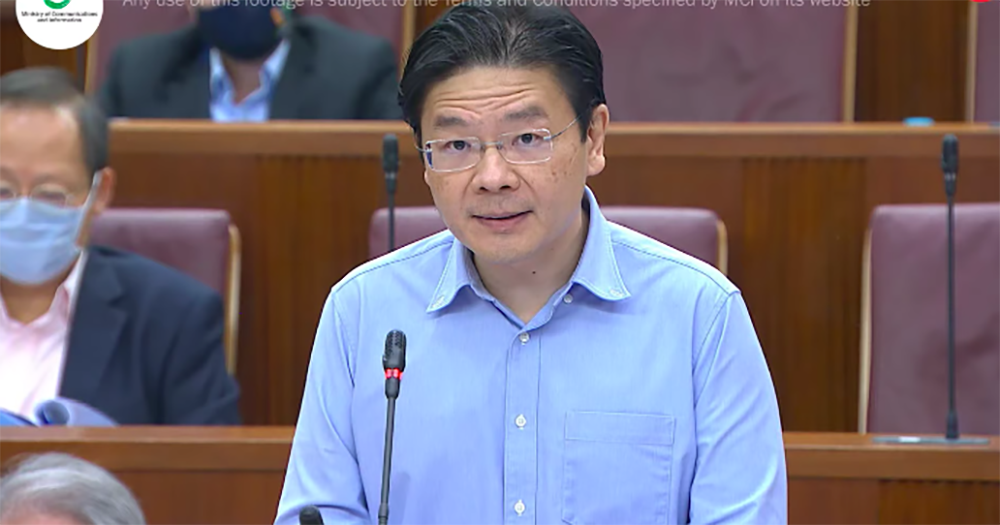The easing of Phase 2 Heightened Alert (P2HA) measures will be differentiated and extended only to people who are vaccinated, as they are better protected against Covid-19, Finance Minister Lawrence Wong said in Parliament on July 26.
As such, this means that if a member of the public wants to participate in social activities like working out at a gym, dining in a restaurant, or attend a large event or religious service with more than 100 people, they must be fully vaccinated, Wong added.
P2HA measures to be reviewed in mid-August
In a ministerial statement, Wong said that the Multi-Ministry Taskforce planned to review the current set of measures in early August.
This will consist of assessing the overall infection situation, and monitoring the status of infected cases so as to confirm that the link between infection and hospitalisation has been weakened by the vaccines.
In addition, around two-thirds of Singapore's population and three-quarters of seniors, aged 70 and above, would have received two doses of the Covid-19 vaccines, at the time of the review.
As such, if clusters are under control and hospitalisation rates are low, some P2HA measures will be eased, Wong added.
Eased travel restrictions for fully vaccinated people
The Finance Minister then highlighted that the government expected about 80 per cent of Singapore's population to have received two doses of the Covid-19 vaccines by early-September.
Wong said, "We will then be able to ease the restrictions further, including allowing larger groups to get together, especially if they are fully vaccinated."
This also means re-opening Singapore's borders, especially for vaccinated people to travel, with the establishment of travel corridors with countries that have brought Covid-19 under control.
Fully vaccinated people will therefore be able to travel without serving the full 14-day Stay-Home Notice (SHN) when they return, he said.
Wong then elaborated that depending on the risk level of the country that vaccinated people visit, the SHN will either be replaced with a "rigorous" test regime, or shortened to seven days.
As for non-vaccinated people, while they can still travel, they will have to abide by prevailing SHN requirements, Wong added.
Rise in cases expected as measures are eased
This led to Wong's next point that a rise in the number of cases is expected as measures are eased.
The Finance Minister said that this is partly due to ongoing cryptic transmission in the community, which can easily break out into new clusters as activity levels increase.
Allowing people to travel without SHN also means more infected people and imported cases will slip through from time to time, he noted.
However, as the majority of Singapore will have been vaccinated at that time, they are much less likely to be severely ill, even if they catch the virus.
The government's focus will therefore be on the "much smaller" number of infected people who require supplementary oxygen or require intensive care.
Key is to open at correct juncture
Wong also said that the key was to open Singapore at the correct juncture.
Here, he pointed out that some countries had decided to fully open even though they had less-than-ideal vaccination rates, and cited the Netherlands and the UK as examples.
In the case of the Netherlands, the country had lifted all restrictions when 45 per cent of its population was fully vaccinated.
Restrictions were then re-imposed after Covid-19 cases surged ten-fold to an average of 10,000 in two week.
As for the UK, it lifted all restrictions on July 19, with 55 per cent of its general population and around 90 per cent of its seniors vaccinated.
Wong noted that cases then surged to 50,000 a day, and are likely to rise further, while hospitalisation and death rates have started to creep up again, almost entirely amongst unvaccinated individuals.
Wong said:
"We are watching what’s happening in these countries very closely. What is clear to the Multi-Ministry Task Force and our medical advisors is that we should be very careful about lifting restrictions when a significant proportion of our people are still not fully vaccinated, especially our more vulnerable seniors."
He added, "While other countries may have come to terms with a certain level of Covid-19 cases and even deaths, this is not the choice we want to make in Singapore. Here, we look out for one another, and we take care of each other."
If hospitalisations or severe illness go up, Singapore must be prepared to pull back
Singapore's approach will therefore be based on monitoring the number of cases that have been hospitalised or are in ICU at each stage of easing, Wong highlighted.
Such cases must remain acceptable and stable before Singapore can proceed to the next step.
Should the number increase, the country will have to be prepared to slow down or even pull back, he added.
In particular, new variants, which may be more transmissible, lethal, or evading present vaccines, could emerge.
Such variants could lead to more severe outbreaks, necessitating the introduction of restrictions from time-to-time, along with a national rollout of booster shots or additional vaccines, Wong said.
The Finance Minister summed up the situation as such:
"In short, there are still considerable uncertainties about how the pandemic will unfold globally. But our best bet is to push ahead with a high level of vaccine coverage for our people. This will give us the best chance to resume more normal lives, while keeping our morbidity and mortality rates low."
Top image screenshot from MCI YouTube
If you like what you read, follow us on Facebook, Instagram, Twitter and Telegram to get the latest updates.
